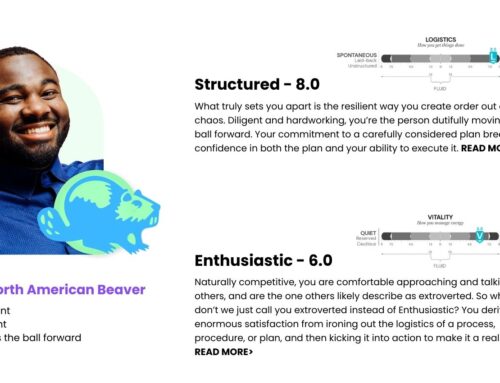Who Is I?
Of all of life’s uncomfortable truths, it might be argued that one stands out above the rest: that we don’t know ourselves nearly as well as we imagine we do.
For thousands of years saints and sages, prophets and philosophers have urged us to focus less on the outside world and more on the one doing all that outward-looking.
A good place to start? Uncovering that most distinct part of you that each day is presented to the world as ‘I’ or ‘me.’ Aka, your personality.
To know thyself is the beginning of wisdom. – Aristotle
After all, there is an enormous body of research demonstrating the immense importance of personality. It is our personality that truly sets us apart, makes us memorable, and remains with us throughout life.
Personality dictates many of our most important preferences (friends and mates, music and food, political candidates and hobbies). Personality also is a key predictor of our likely success in education, jobs, and relationships. Truly, personality’s influence over our lives is endless.
All of which is why, if you don’t know (and thereby own) your personality, your personality is going to own you (and no doubt lead you into some circumstances you’d prefer to avoid).
Who’s Running the Show?
If it’s your personality that is leading the charge into the world each and every day, it’s probably not a bad idea to have a rock-solid understanding of what, exactly, it’s comprised of.
This idea takes on added weight when you consider all the research demonstrating that most of us form opinions about others within seconds – sometimes milliseconds – of meeting someone.
The most difficult thing in life is to know yourself. – Thales of Miletus
And while people sometimes are correct in those early estimations – sometimes they’re not. Yet if we don’t know ourselves, it’s easy to allow the estimations and opinions of others to influence our own sense of ourselves.
You may be a Quiet personality, for example. From a scientific perspective, we would describe that as someone who is:
- Careful about where and with whom they expend their energies
- Recharged by solitary activities
- Thoughtful before speaking
- Fond of intimate, meaningful friendships
Good stuff, right? But a stranger may immediately dismiss you as someone who is aloof, uninterested, and has nothing to say.
Now imagine that stranger is a potential new friend, instructor, or hiring manager.
And now imagine you don’t know any better – that the stranger’s opinion about you becomes your opinion about you. A rejection, for example, is taken personally. But to the individual who knows him/herself well, it’s dusted off as nothing more than a bad fit.
What To Do?
Fortunately, there is a lot of good, dependable personality science available today. It’s obviously what our own company, Lucidata, was founded on – providing easy access to solid personality science.
So take a personality assessment that is based in science – if not ours, someone else’s. Start stitching together the pieces of your personality so that you have a better understanding of what makes you, so distinctly you.
Added benefit: the better versed you are in the mechanics of personality, the better able you’ll be at recognizing personality traits in others. In a sense, this puts you in change of any level of group dynamic, since you’ll have a solid understanding of the players from the inside, out.
Who Is I?
Of all of life’s uncomfortable truths, it might be argued that one stands out above the rest: that we don’t know ourselves nearly as well as we imagine we do.
For thousands of years saints and sages, prophets and philosophers have urged us to focus less on the outside world and more on the one doing all that outward-looking.
A good place to start? Uncovering that most distinct part of you that each day is presented to the world as ‘I’ or ‘me.’ Aka, your personality.
To know thyself is the beginning of wisdom. – Aristotle
After all, there is an enormous body of research demonstrating the immense importance of personality. It is our personality that truly sets us apart, makes us memorable, and remains with us throughout life.
Personality dictates many of our most important preferences (friends and mates, music and food, political candidates and hobbies). Personality also is a key predictor of our likely success in education, jobs, and relationships. Truly, personality’s influence over our lives is endless.
All of which is why, if you don’t know (and thereby own) your personality, your personality is going to own you (and no doubt lead you into some circumstances you’d prefer to avoid).
Who’s Running the Show?
If it’s your personality that is leading the charge into the world each and every day, it’s probably not a bad idea to have a rock-solid understanding of what, exactly, it’s comprised of.
This idea takes on added weight when you consider all the research demonstrating that most of us form opinions about others within seconds – sometimes milliseconds – of meeting someone.
The most difficult thing in life is to know yourself. – Thales of Miletus
And while people sometimes are correct in those early estimations – sometimes they’re not. Yet if we don’t know ourselves, it’s easy to allow the estimations and opinions of others to influence our own sense of ourselves.
You may be a Quiet personality, for example. From a scientific perspective, we would describe that as someone who is:
- Careful about where and with whom they expend their energies
- Recharged by solitary activities
- Thoughtful before speaking
- Fond of intimate, meaningful friendships
Good stuff, right? But a stranger may immediately dismiss you as someone who is aloof, uninterested, and has nothing to say.
Now imagine that stranger is a potential new friend, instructor, or hiring manager.
And now imagine you don’t know any better – that the stranger’s opinion about you becomes your opinion about you. A rejection, for example, is taken personally. But to the individual who knows him/herself well, it’s dusted off as nothing more than a bad fit.
What To Do?
Fortunately, there is a lot of good, dependable personality science available today. It’s obviously what our own company, Lucidata, was founded on – providing easy access to solid personality science.
So take a personality assessment that is based in science – if not ours, someone else’s. Start stitching together the pieces of your personality so that you have a better understanding of what makes you, so distinctly you.
Added benefit: the better versed you are in the mechanics of personality, the better able you’ll be at recognizing personality traits in others. In a sense, this puts you in change of any level of group dynamic, since you’ll have a solid understanding of the players from the inside, out.



